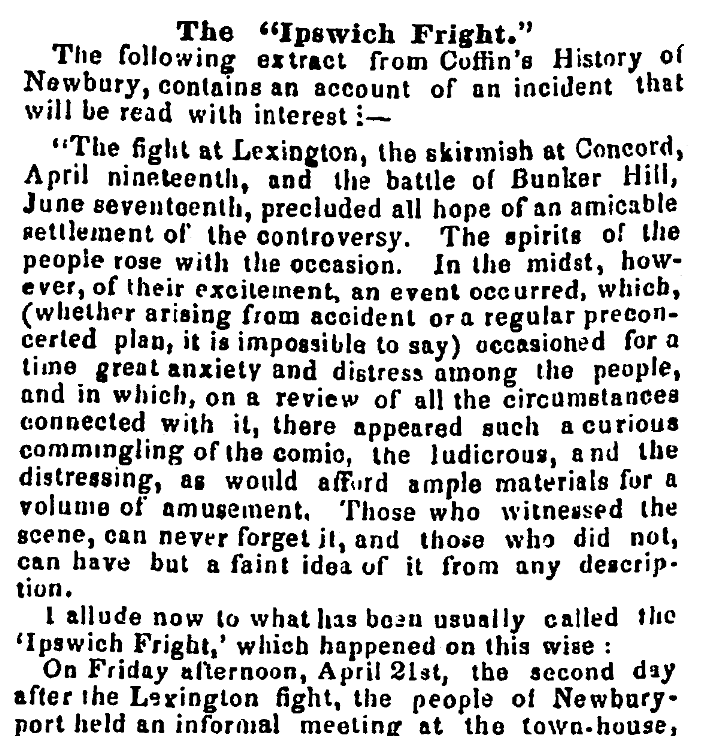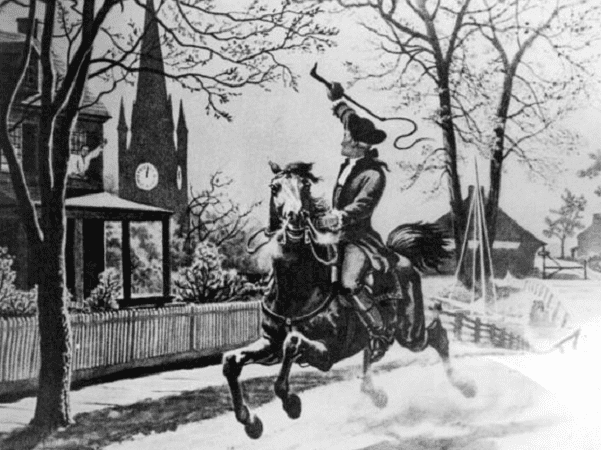Introduction: In this article, Melissa Davenport Berry writes about the ride warning that the British were coming that the history books forgot – not Paul Revere’s ride, but Ebenezer Todd’s. Melissa is a genealogist who has a website, americana-archives.com, and a Facebook group, New England Family Genealogy and History.
Author’s Note: This wicked tall tale from the archives lasted only a night but managed to ignite a sizzling terror. For GenealogyBank Blog readers I offer a cool chronicle tidbit for Independence Day.
We all know the story of the famous dispatcher Paul Revere, who made the midnight ride on 18 April 1775 to warn the colonial militia that the Brits were coming. Revere was not the only one to deliver a message of warning.
Three days after Revere’s ride – and two days after the Battles of Lexington and Concord – a Mr. Ebenezer Todd made tracks through the dusty trails and back roads of Essex County, Massachusetts, to warn that another British invasion was coming – only in his case, it was a false alarm that caused widespread panic.
The Newburyport Herald published historian Joshua Coffin’s account of what happened that strange day, 21 April 1775, when Mr. Todd – by order of officials – broke up a community meeting hosted by Parson Thomas Carey in Newburyport, Massachusetts.
What happened next, according to Coffin’s history,
“…occasioned for a time great anxiety and distress among the people, and in which, on a review of all the circumstances connected with it, there appeared such a curious commingling of the comic, the ludicrous, and the distressing, as would afford ample materials for a volume of amusement.”

Carey was about to deliver an opening prayer to comfort his flock and bring news of the fighting at Lexington when Todd approached the meetinghouse with hurried hoof-beats and stormed through the doors shouting, according to Coffin:
“For God’s sake, turn out! turn out! or you will all be killed! The [British] regulars are marching this way, and will soon be here. They are now at Ipswich, cutting and slashing all before them!”
This message of terror created quite a commotion: “The news spread like wildfire, and being generally credited, the consternation became almost universal.”
Coffin noted that “all sorts of ludicrous things were done by men and women to escape impending destruction.” Crazed and frightened town folk scurried like mice from a hungry wild cat. Vehicles and carriages flooded the streets, and many headed for safer terrain on foot. Additional Revere wannabes added to the panic, screaming, “Flee for your lives! Flee for your lives! The regulars are coming!”
Some crossed the river for safety – some in Salisbury went to Hampton, New Hampshire, and spent the night.
One man hid private documents under a large stone in his field and battened down the hatches with musket in hand, “resolved to sell his life as dearly as possible” Another woman threw all her precious silver in the well, but her fresh, hot pies were another matter – no rebel would get a taste of her tarts.
Coffin reported a story that one confused woman ran four or five miles before making a pit stop on the steps of Reverend Oliver Noble’s meetinghouse to nurse her infant, only to discover she had grabbed the cat instead when she fled in terror.
In another instance recalled by Coffin, a feisty fellow was determined to protect his turf:
“In another instance, a Mr. J. L. seeing Mr. C. H., a very corpulent man, standing at his door with his musket loaded, inquired of him if he was not going. ‘Going! No.’ said he, ‘I am going to stop and shoot the devils.’”
At one point, the destruction of the Parker and Thorla bridges was proposed, but thankfully, a handful of concerned citizens decided that it would be wise to validate the claim before acting on it. They discovered the warning had no credence.
It was Mr. Eliphalet Hale of Exeter, New Hampshire, who made haste to undeceive the people by riding from Ipswich to Newbury in 50 minutes.
The Newburyport Herald article ends this way:
Tune back in for more on the Great Ipswich Fright.
Note: An online collection of newspapers, such as GenealogyBank’s Historical Newspaper Archives, is not only a great way to learn about the lives of your ancestors – the old newspaper articles also help you understand American history and the times your ancestors lived in, and the news they talked about and read in their local papers. Have you traced your ancestors back to the Revolutionary era and the time of Paul Revere’s ride? Please share your stories with us in the comments section.
Explore over 330 years of newspapers and historical records in GenealogyBank. Discover your family story! Start a 7-Day Free Trial
Further Reading:
- Coffin, Joshua & Bartlett, Joseph. “A Sketch of the History of Newbury, Newburyport, and West Newbury, from 1635 to 1845.” Boston, MA, 1845. S. G. Drake.
